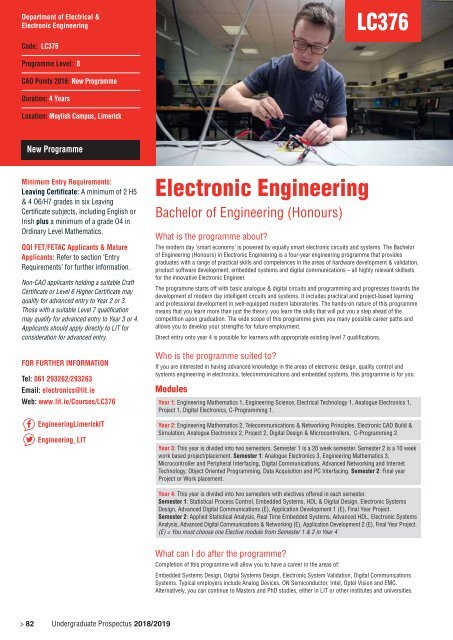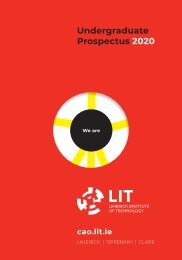LIT_fulltime2017
Create successful ePaper yourself
Turn your PDF publications into a flip-book with our unique Google optimized e-Paper software.
Department of Electrical &<br />
Electronic Engineering<br />
LC376<br />
Code: LC376<br />
Programme Level: 8<br />
CAO Points 2016: New Programme<br />
Duration: 4 Years<br />
Location: Moylish Campus, Limerick<br />
New Programme<br />
Minimum Entry Requirements:<br />
Leaving Certificate: A minimum of 2 H5<br />
& 4 O6/H7 grades in six Leaving<br />
Certificate subjects, including English or<br />
Irish plus a minimum of a grade O4 in<br />
Ordinary Level Mathematics.<br />
QQI FET/FETAC Applicants & Mature<br />
Applicants: Refer to section ‘Entry<br />
Requirements’ for further information.<br />
Non-CAO applicants holding a suitable Craft<br />
Certificate or Level 6 Higher Certificate may<br />
qualify for advanced entry to Year 2 or 3.<br />
Those with a suitable Level 7 qualification<br />
may qualify for advanced entry to Year 3 or 4.<br />
Applicants should apply directly to <strong>LIT</strong> for<br />
consideration for advanced entry.<br />
FOR FURTHER INFORMATION<br />
Tel: 061 293262/293263<br />
Email: electronics@lit.ie<br />
Web: www.lit.ie/Courses/LC376<br />
EngineeringLimerickIT<br />
Engineering_<strong>LIT</strong><br />
Electronic Engineering<br />
Bachelor of Engineering (Honours)<br />
What is the programme about?<br />
The modern day ‘smart economy’ is powered by equally smart electronic circuits and systems. The Bachelor<br />
of Engineering (Honours) in Electronic Engineering is a four-year engineering programme that provides<br />
graduates with a range of practical skills and competences in the areas of hardware development & validation,<br />
product software development, embedded systems and digital communications – all highly relevant skillsets<br />
for the innovative Electronic Engineer.<br />
The programme starts off with basic analogue & digital circuits and programming and progresses towards the<br />
development of modern day intelligent circuits and systems. It includes practical and project-based learning<br />
and professional development in well-equipped modern laboratories. The hands-on nature of this programme<br />
means that you learn more than just the theory, you learn the skills that will put you a step ahead of the<br />
competition upon graduation. The wide scope of this programme gives you many possible career paths and<br />
allows you to develop your strengths for future employment.<br />
Direct entry onto year 4 is possible for learners with appropriate existing level 7 qualifications.<br />
Who is the programme suited to?<br />
If you are interested in having advanced knowledge in the areas of electronic design, quality control and<br />
systems engineering in electronics, telecommunications and embedded systems, this programme is for you.<br />
Modules<br />
Year 1: Engineering Mathematics 1, Engineering Science, Electrical Technology 1, Analogue Electronics 1,<br />
Project 1, Digital Electronics, C-Programming 1.<br />
Year 2: Engineering Mathematics 2, Telecommunications & Networking Principles, Electronic CAD Build &<br />
Simulation, Analogue Electronics 2, Project 2, Digital Design & Microcontrollers, C-Programming 2.<br />
Year 3: This year is divided into two semesters. Semester 1 is a 20 week semester. Semester 2 is a 10 week<br />
work based project/placement. Semester 1: Analogue Electronics 3, Engineering Mathematics 3,<br />
Microcontroller and Peripheral Interfacing, Digital Communications, Advanced Networking and Internet<br />
Technology, Object Oriented Programming, Data Acquisition and PC Interfacing. Semester 2: Final year<br />
Project or Work placement.<br />
Year 4: This year is divided into two semesters with electives offered in each semester.<br />
Semester 1: Statistical Process Control, Embedded Systems, HDL & Digital Design, Electronic Systems<br />
Design, Advanced Digital Communications (E), Application Development 1 (E), Final Year Project.<br />
Semester 2: Applied Statistical Analysis, Real Time Embedded Systems, Advanced HDL, Electronic Systems<br />
Analysis, Advanced Digital Communications & Networking (E), Application Development 2 (E), Final Year Project.<br />
(E) = You must choose one Elective module from Semester 1 & 2 in Year 4<br />
What can I do after the programme?<br />
Completion of this programme will allow you to have a career in the areas of:<br />
Embedded Systems Design, Digital Systems Design, Electronic System Validation, Digital Communications<br />
Systems. Typical employers include Analog Devices, ON Semiconductor, Intel, Optel Vision and EMC.<br />
Alternatively, you can continue to Masters and PhD studies, either in <strong>LIT</strong> or other institutes and universities.<br />
> 82 Undergraduate Prospectus 2018/2019









